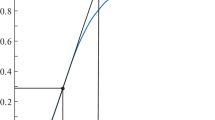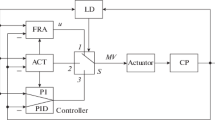Abstract
An engineering method for optimizing the parameters of PI and PID controllers for a second-order controlled plant with time delay is considered. An integral quality criterion involving minimization of the control output is proposed for optimizing the control system, which differs from the existing ones in that the effect the control output has on the technological process is taken into account in a correct way. The use of such control makes it possible to minimize the expenditure of material and/or energy resources, to limit the wear, and to increase the service life of the control devices. The unimodal nature of the proposed quality criterion for solving optimal controller tuning problems is numerically confirmed using the optimization theory. A functional correlation between the optimal controller parameters and dynamic properties of a controlled plant is determined for a single-loop control system with the use of calculation methods. The results from simulating the transients in the control system using the proposed and existing functional dependences are compared. The proposed calculation formulas differ from the existing ones by having simple structure, high accuracy of searching for the optimal controller parameters; they allow efficient control to be obtained and can be used for tuning automatic control systems in a wide range of controlled plant dynamic properties. The obtained calculation formulas are recommended for being used by engineers specializing in automation for designing new and optimizing the existing control systems.
Similar content being viewed by others
References
I. M. Golinko, Yu. M. Kovrigo, and A. I. Kubrak, “An express method for optimally tuning an analog controller with respect to integral optimality criteria,” Therm. Eng. 61(3), 189 (2014). DOI: 10.1134/S0040363613110052
A. O’Dwyer, Handbook of PI and PID Controller Tuning Rules (Dublin Inst. of Technol., 2009).
V. Ya. Rotach, The Automatic Control Theory: A Handbook for Higher Schools (MEI, Moscow, 2004) [in Russian].
I. M. Golinko, “Synthesis of optimal control systems with minimizing the control output,” Radioelektr. Komp. Sist., No. 2 (54), 79–88 (2012).
I. M. Golinko and A. I. Kubrak, Modeling and Optimization of Control Systems: A Monograph (Ruta, Kamyanets-Podilskii, 2012) [in Ukrainian].
Yu. M. Kovrigo, M. A. Konovalov, and A. S. Bunke, “Modernizing the heat load control system of a oncethrough boiler unit at a thermal power station using a dynamic corrector,” Therm. Eng. 59(10), 772 (2012).
A. I. Kubrak, A. I. Zhuchenko, and M. Z. Kvasko, Computer Simulation and Identification of Automatic Systems: A Handbook (Politekhnika, Kyiv, 2004) [in Ukrainian].
I. M. Golinko, A. I. Kubrak, and I. E. Galitskaya, “An engineering method for optimizing a PI controller with respect to the disturbance channel,” Mekhan. Giroskop. Sist., No. 26, 21–31 (2013).
Author information
Authors and Affiliations
Corresponding author
Additional information
Original Russian Text © I.M. Golinko, 2014, published in Teploenergetika.
Rights and permissions
About this article
Cite this article
Golinko, I.M. Optimal tuning of a control system for a second-order plant with time delay. Therm. Eng. 61, 524–532 (2014). https://doi.org/10.1134/S0040601514070039
Published:
Issue Date:
DOI: https://doi.org/10.1134/S0040601514070039




